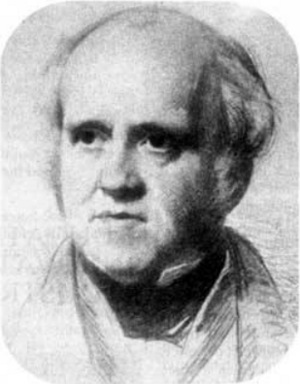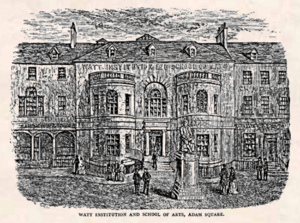Leonard Horner facts for kids
Leonard Horner (born January 17, 1785 – died March 5, 1864) was an important Scottish person. He was a merchant, a geologist (someone who studies rocks and the Earth), and a reformer who worked to improve education. He was the younger brother of Francis Horner.
Leonard Horner helped start the School of Arts of Edinburgh, which is now Heriot-Watt University. He also helped create the Edinburgh Academy. He was a "radical educational reformer," meaning he wanted big changes in education. He was also involved in setting up University College School. Horner served as a commissioner on the Royal Commission, which looked into how children were employed in factories. Many people believe he did more than anyone else in the 1800s to make working conditions better for women and children in factories in northern England.
Early Life and Education
Leonard's father, John Horner, was a linen merchant in Edinburgh. Leonard was the youngest of three sons. He went to the High School and then started at the University of Edinburgh in 1799. For the next four years, he studied chemistry and mineralogy. He developed a love for geology from a book called Playfairs Illustrations of the Huttonian Theory.
When he was 19, Leonard became a partner in a part of his father's business. He then moved to London for work.
Career and Achievements
In 1808, Leonard Horner joined the new Geological Society of London. Two years later, he was chosen as one of its secretaries. He was very dedicated to this society throughout his life. He was even elected president twice, in 1846 and again in 1860. In 1811, he presented his first paper about the rocks of the Malvern Hills. He also wrote about the salt springs at Droitwich and the geology of southwest Somerset.
In 1813, he became a fellow of the Royal Society. In 1815, he went back to Edinburgh to manage his family's business. While there, in 1821, he helped create the Edinburgh School of Arts on Adam Square. This school taught mechanics and art. He also helped found the Edinburgh Academy.
In 1827, he was asked to become the warden of London University (now University College London). He held this job for four years. After that, he lived in Bonn, Germany, for two years. There, he continued to study minerals and rocks. When he returned, he shared papers with the Geological Society about the geology around Bonn. He also wrote about the amount of solid material in the water of the Rhine River. He made important discoveries about a type of soil called loess. He also created the first map of the Siebengebirge region in Germany.
In 1828, he returned to Edinburgh to help with his father's company, as his father was ill. After his father's death in 1829, Leonard took full charge of the company until 1833.
In 1833, he was appointed as a commissioner to investigate how children were being used in factories across Great Britain. He was later chosen as one of the inspectors. He held this important job for 26 years. During this time, he worked hard to improve the working conditions for women and children in the factories of northern England. Many people believe he made the biggest difference in this area during the 1800s. Even Karl Marx, a famous thinker, praised Horner in his book Das Kapital. Later in his life, Horner also studied the geological history of the lands in Egypt. In 1843, he published a book about the life of his brother, Francis.
Family Life
Leonard Horner married Anna Susanna Lloyd. They had six daughters. All of their daughters received a good education, which was quite unusual for women at that time.
Their oldest daughter, Mary Elizabeth, married Sir Charles Lyell in 1832. Charles Lyell was a famous geologist who wrote The Principles of Geology. Another daughter, Katharine, married Charles Lyell's younger brother, Henry, in 1848. Katharine later edited a book about Charles Lyell's life and letters. A third daughter, Frances, married Charles Bunbury, who was known for studying ancient plants. Another daughter, Leonora, married Georg Heinrich Pertz, a historian. Through this connection, Leonard Horner was the step-great-great-grandfather of Cecilia Payne-Gaposchkin, a famous astronomer. Two other daughters, Susan and Joanna, wrote a book about walking tours in Florence, Italy.
Death
Leonard Horner passed away in Montagu Square in London on March 5, 1864.



